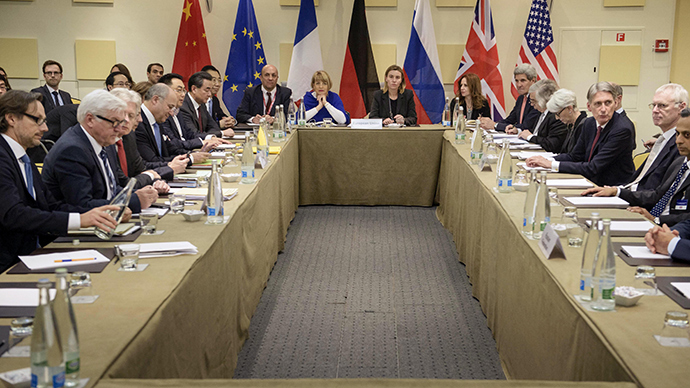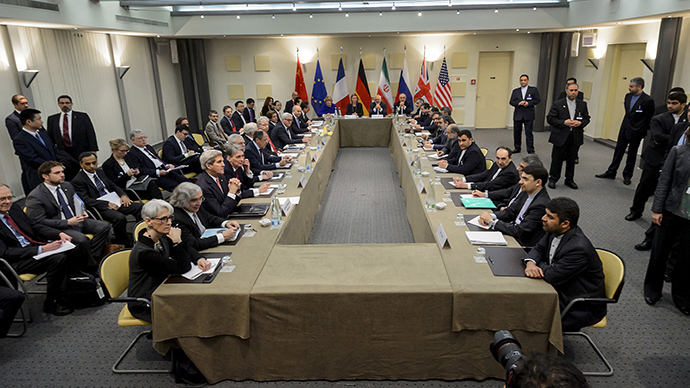‘Nuclear deal would open new opportunities for Iran-US relations ’

If P5+1 talks with Iran succeed, a new page in Iran-US relations can be opened and increase positive diplomatic opportunities between the two countries and other states in the region, Jamal Abdi of the National Iranian-American Council told RT.
There have been three days of exhaustive talks on an Iranian nuclear deal in Switzerland with the deadline of Tuesday. Diplomats held around 25 meetings on Sunday. For Iran, a deal would signal the end of nine years of sanctions and isolation.
RT:There's been much effort, with all sides citing progress and sticking points. How do you assess the possibility of a deal?
Jamal Abdi: I’m pretty confident we’re going to see a deal. I don’t think the parties have got this far and resolve this much, this thing is almost done, in order to see a collapse. I think that this is a moment for potential brinkmanship, attempts to get the best possible deal, the last mile of the race. But when this is all said and done we are going to see a deal.
RT:What about the fact that some of the diplomats have left Lausanne. Is it something to worry about?
JA: That it is a reflection that on some of these issues they are still working through them. They are not ready to sign on the line and do a ceremony quite yet. I think there is a little bit of frustration that this hasn’t been completely resolved yet. The goal obviously was to get it done by Tuesday. That being said, it’s clear that diplomats flying out are prepared to fly right back in as soon as they overcome these last remaining hurdles. So hopefully we’ll see a return flight from some of these people.

RT:Iran's main condition is for sanctions to be lifted. Do you think that's realistic? Will Iran walk away if it doesn’t happen?
JA: For the P5+1 [Russia, the US, the UK, China, France+ Germany] the bottom line was a deal that ensures Iran doesn’t get nuclear weapons. And the way they want to do that is ensure there is one year breakout time for Iran. So if they started cheating, it would take a full year in order to just get the fuel for a nuclear weapon, and there’s enough confidence that they will achieve that objective. For Iran the bottom line here is to get sanctions lifted. And if they can’t get the sanctions lifted or if they can’t get a deal where they are able to bring it back home and show the practical benefits of making these really strange compromises on their nuclear program - that would be a deal killer. That being said, I think that there is intense technical negotiation. Dealing with the UN sanctions is no easy task to accomplish and really devising a mechanism where the sanctions get lifted but there still is some means of putting the sanctions back into place if the deal falls apart. I think that is really where things are hinged, where a creative solution hopefully will materialize in order to resolve everybody’s concerns.
RT:We've been seeing a shift in Western attitudes towards Iran with the US, particularly, more willing to engage than it has for years. What's caused this turnaround?
JA: I think the decisive factor was the election of new Iranian President Hassan Rouhani, who took this message to the public and said: “We want to engage with the outside world; we want to reflect the desires of the Iranian people to be engaged.” And you couple that with the situation in Washington where you have a president who came in the office, President Obama, campaigning on the notion that he was going to engage the Iranians and make up for some of the missed opportunities of the Bush years in which there were opportunities to start to bridge the gap with Iran and end this long standoff- these opportunities were missed. Now we have a window here where you have the new Iranian president; you have Obama with two years left, the stars sort of aligned. But it all hinged on this one issue that is not even the totality of the issues between two countries, but this nuclear issue. And if we can fix the nuclear issue we might begin to turn the page and shift the paradigm, and see increased, positive opportunities for diplomacy between the US and Iran, and other states in the region.
MORE:
The statements, views and opinions expressed in this column are solely those of the author and do not necessarily represent those of RT.
The statements, views and opinions expressed in this column are solely those of the author and do not necessarily represent those of RT.












